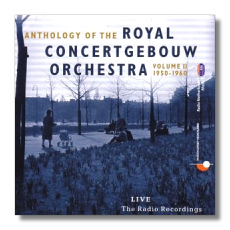
The Internet's Premier Classical Music Source
Related Links
-
Berlioz Reviews
Brahms Reviews
Debussy Reviews
Falla Reviews - Latest Reviews
- More Reviews
-
By Composer
-
Collections
DVD & Blu-ray
Books
Concert Reviews
Articles/Interviews
Software
Audio
Search Amazon
Recommended Links
Site News
 CD Review
CD Review
Leopold Stokowski Conducts the Concertgebouw

- Hector Berlioz: Roman Carnival Overture
- Claude Debussy: Prelude to the Afternoon of a Faun
- Manuel de Falla: El amor brujo (Orchestral Version)
- Johannes Brahms: Symphony #2
Royal Concertgebouw Orchestra/Leopold Stokowski
Q-Disc 97018 (14CD Set: Q97014) 5 July 1951 Monaural
Computers and the Net are the most liberating (did they discover the Net, create it or some blend of the two?) things of the 20th Century. There are plenty of good people out there who will pay for an expensive 14 disc release, select one from it and offer to burn copies for interested parties. Now, whoever these people are, if they earn enough to buy a pint for each one they send, well I don't think it's going to be much for them and not a substantial loss for the people who put together the original set. The company would probably have done a hell of a lot better if they'd just released them separately.
This disc is from a 14-CD set on the Q Disc label. I have no idea if it is an official release from the Concertgebouw since no information is provided about that but all of the contents are with that orchestra with different conductors. This disc represents the entire concert Stokowski performed in his 1951 tour of Europe.
The Berlioz is exciting. I once talked with one of the engineers who took part in the Bell Labs experimental recordings made in Philadelphia during live concerts in 1932. Stokowski had just started to rehearse the orchestra and he asked the engineer (I wish I could recall his name) if there was any particular piece of music he'd like to hear. He told Stokowski to do the Roman Carnival Overture. The Mysterioso played the piece without stop. By the time it was over Stokowski was drenched in sweat. Listening to this you can imagine that if not Stokowski, the orchestra was probably drenched.
The Debussy has been previously released on Globe 6905 in 1997. That release was remastered at a lower level and the difference is significant. The soloist, Hubert Barwahser, does an unforgettable job on the flute solos and his sound is clearer and more defined than in the Globe CD. As usual with Stokowski, sensual music is erotic.
The de Falla is, again, sensuous. Stokowski was fond of silk robes and pajamas, he loved more women than we know about and we know about 4. When he conducted sensuous music, such as these two items no one did it better.
The Brahms was apparently a staple in Stokowski's 1951 tour. He played it again, 11 days later, with the Bavarian Radio Symphony (on Tahra 485-86 a set containing excellent material but unfortunately miserable sound). Stokowski's way with this symphony is unlike any other I have heard. It is more autumnal; a friend of mine labeled it "Brahms' Tragic Symphony. His assessment is a bit too severe but Stokowski does not see it as a youthful, joyous affair as others. I have always liked his interpretation and it is a more than valid one. It is particularly educational to listen to his and then Furtwängler.
The only reservation I have, and it is not so serious as to preclude a recommendation, is the sound. The sound is afflicted with what seems like FM hiss (or could it be AM?). Then, again, it reminds me most of all as acetate tapes. This problem is particularly noticeable in the Debussy. The noise problem was evident in the Globe release though, due to the lower level transfer, not as noticeable. The sound gets better as the music goes along and cannot be heard to any distraction by the time you get to the Falla. Otherwise the sound is very, very good with excellent orchestral perspective. This is an indispensable issue for all lovers of the music making of Leopold Stokowski.
Copyright © 2004, Robert Stumpf II

















